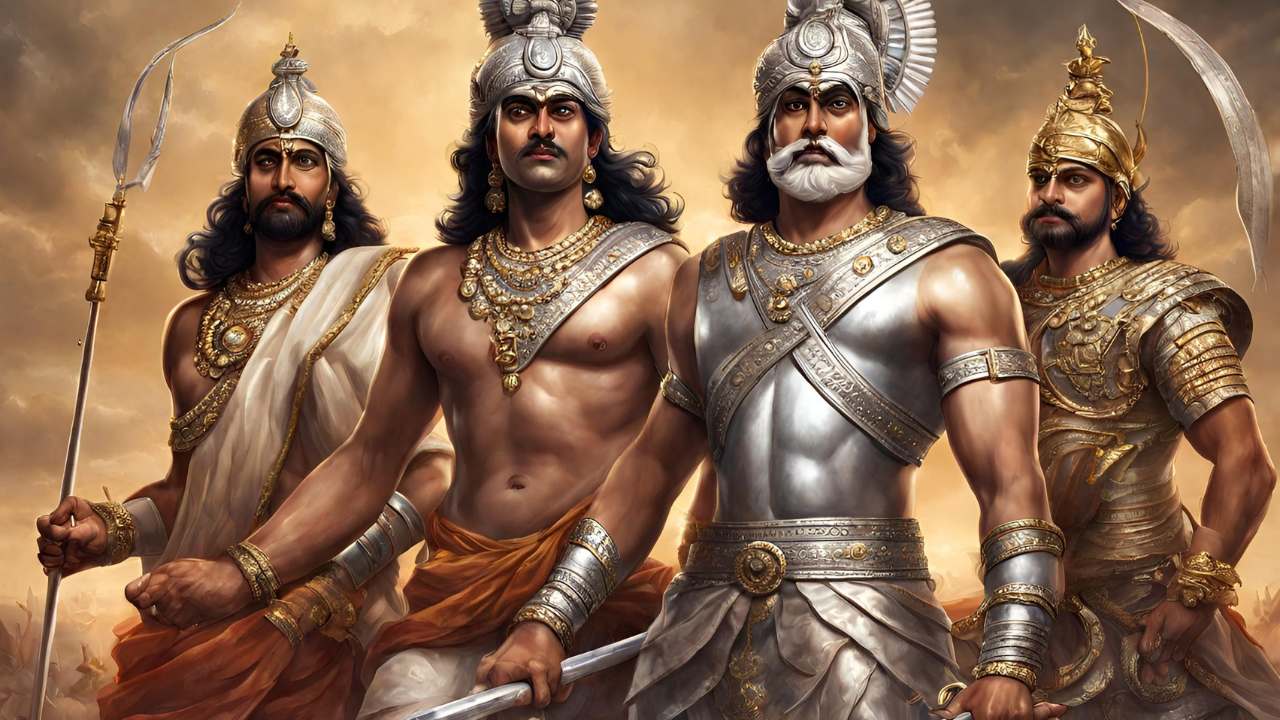The Mahabharata is one of the two greatest epics of India, the other being the Ramayana.
The Mahabharata is an ancient Hindu epic about a fierce rivalry between the Kauravas and the Pandava brothers, who fought for the throne. This rivalry culminated in the Kurukshetra War, a major battle. Just before the war, Lord Krishna shared the wisdom of the Bhagavad Gita with Arjuna.
Over the years, the Mahabharata has been retold countless times, and while there may be some changes in the details due to poetic expression and communication differences, the essence of the epic has remained accurate through multiple retellings.
Certainly, despite its widespread retelling, there remain numerous lesser-known facts within the Mahabharata that can truly captivate and surprise you. I highly recommend reading the historicity of Mahabharata to get an insight into the factual aspects of the great epic.
25 Interesting lesser-known facts from The Mahabharata you probably didn’t know before now.
1. Mahabharata was initially known as Jaya (‘Jayam’)

Until very recently, the Mahabharata wasn’t known by its current name. Originally, it was referred to as Jayam or Jaya. Over time, its title evolved from Jaya to Vijaya, then Bharatam, and finally Mahabharatam or Mahabharata.
Initially, Jaya comprised about twenty-five thousand verses, while the final version expanded to over one hundred thousand verses. Jaya focused on spiritual victory, Vijaya on material victory, Bharata on clan narratives, and Mahabharata incorporated the wisdom of Bharat-Varsha.
What began as an auspicious concept transformed into a massive documentation of realities that could unsettle the common man.
Many contemporary scholars, writers, and playwrights, overwhelmed by the labyrinth of stories within the final version, argue that the Mahabharata primarily conveys the futility of war.
2. The youngest Pandava, Sahdev had the power to see into the future
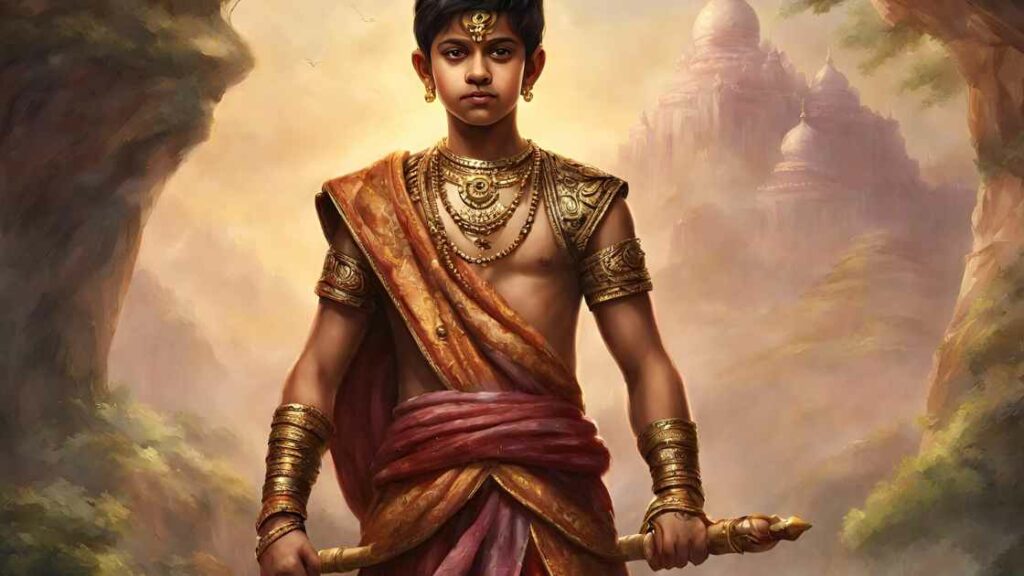
Sahadev, the youngest brother of the Pandavas, possessed the remarkable ability to foresee the future and all the events of the Kurukshetra war, including its outcome and the fate of each individual. However, he chose to remain silent due to a curse that would result in his death if he revealed anything.
In some versions of the Mahabharata, it’s suggested that Sahadev gained this knowledge by consuming his father’s flesh or brains. Alternatively, he is depicted as an astrologer and a highly intelligent individual.
In a humorous incident, upon realizing his knowledge of the future, Sahadev attempted to divulge everything to his family, but he was intercepted by a stranger—Lord Krishna himself. Krishna instructed Sahadev to keep silent and never voluntarily disclose any information. Instead, he advised Sahadev to respond to questions with other questions.
Thus, Sahadev found himself in a peculiar predicament—he knew everything but was unable to share his knowledge with anyone. This is one of the fascinating hidden facts of the Mahabharata.
3. Duryodhana’s real name was Suyodhana
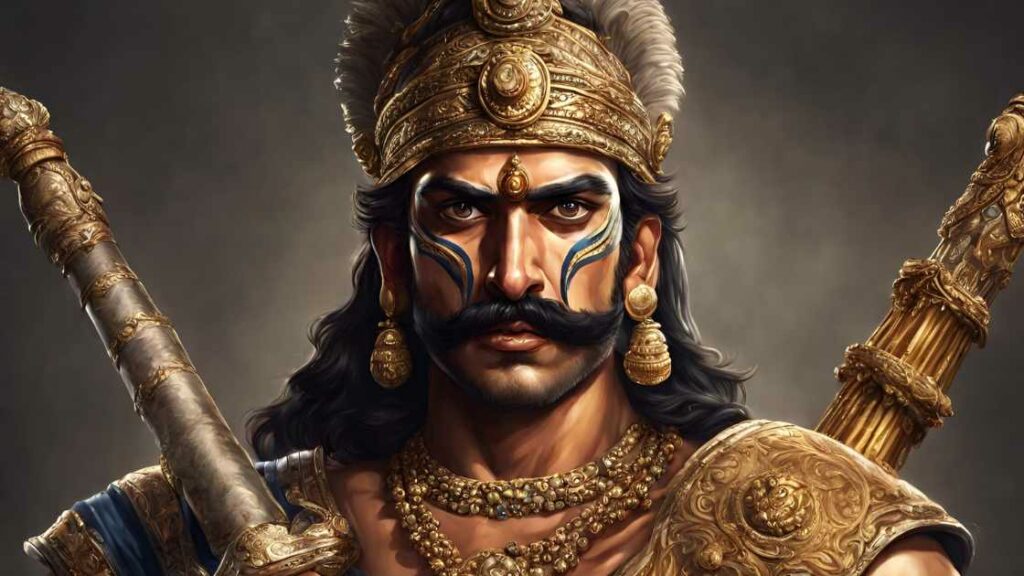
Indeed, the names of the Kaurava clan members, such as Sushaasana and Suchala, differ from the more familiar Dusshaasana and Dusshala.
These names were likely given nicknames reflecting their negative reputations. In Hindi and Sanskrit, words beginning with “Du” often carry negative intents, while those beginning with “Su” tend to be positive.
Another theory suggests that when Duryodhana was born, his father Dhritrashtra named him Suyodhan, indicating his interest in mace fighting.
After completing his primary education under Guru Dronacharya, Duryodhana sought higher learning in the art of mace fighting from Balram. During their final practice session, Duryodhana defeated Balram, earning the title “Duryodhana,” meaning “a warrior who cannot be defeated,” bestowed upon him by Balram in recognition of his prowess.
You May Also Like: 25 Interesting Lesser Known Facts From The Ramayana That You Should Know About
4. Vedvyas is not a name but a post
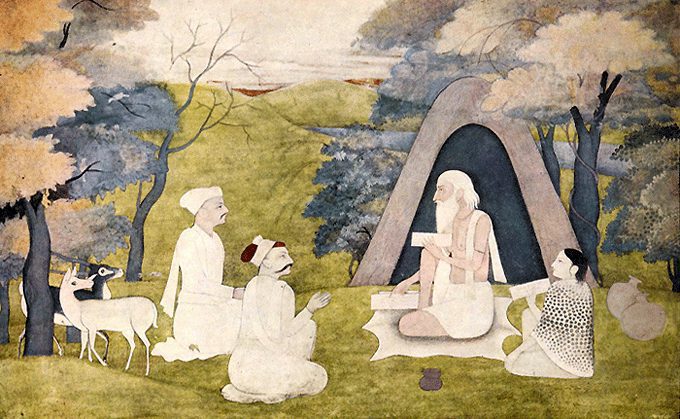
We all know that Vedvyas told the Mahabharata story, and Lord Ganesha wrote it down. But Vedvyas isn’t a name, it’s a title for someone who knows a lot about the Vedas.
Krishnadweepayan, also known as Vedvyas, is traditionally credited with narrating the Mahabharata, rather than writing it down. While he is often depicted as the compiler and narrator of the epic, the writing of the Mahabharata is attributed to Lord Ganesha, who inscribed the text as Vedvyas dictated it.
Before Krishnadweepayan, there were 27 Vedvyas. Krishnadweepayan became the 28th Vedvyas because he had a skin color like Lord Krishna’s and was born on an island. That’s why he got the name “Krishnadweepayan.”
5. Not all Kauravas were against the Pandavas in the war
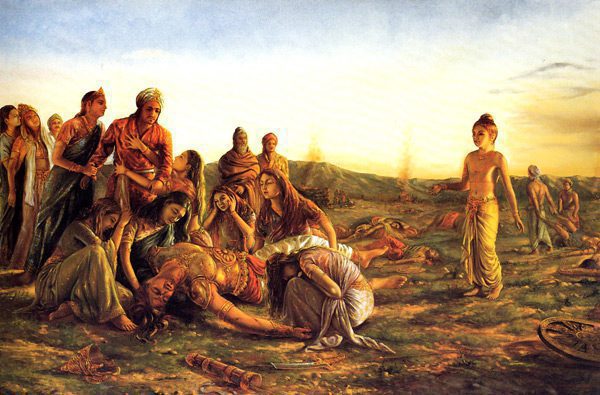
Two of Dhritarashtra’s sons, Vikarna and Yuyutsu did not approve of Duryodhana’s actions and had actually protested against Draupadi being staked in the game of dice.
Interestingly, Vikarna was the third son of Gandhari and Dhritarashtra –and also the third most reputable of Kauravas after Duryodhana and Dussasana.
Despite his apprehensions, Vikarna still fought on the Duryodhana side during the Kurukshetra War. Bhishma even named him one of the great warriors on the Kaurava side.
While Yuyutsu was the only son of Dhritarashtra with Vaishya aka Sughada/Sauvali, his wife Gandhari’s maid. He was the paternal half-sibling to Gandhari’s children — Duryodhana and the rest of the 100 Kaurava brothers and their sister Dushala.
Before the start of the battle of the Kurukshetra War between Kauravas and Pandavas, Yuyutsu shifts from Kauravas to the Pandava camp — ultimately, he was the only Kaurava brother and son of Dhritarashtra who survived the Kurukshetra war.
6. In Mahabharata, Vidur was the avatar of Yamraj
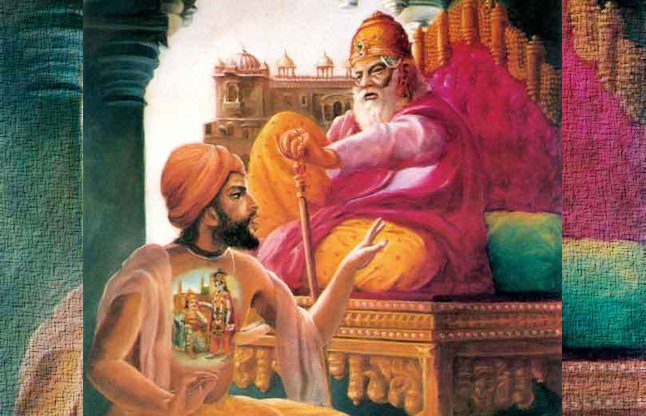
According to the Mahabharata, Vidura was the half-brother of the kings Dhritarashtra and Pandu from Hastinapura. He was born to the sage Vyasa and Sûdri, who served as a lady-in-waiting to the queens Ambika and Ambalika.
In Hindu mythology and some interpretations of the Mahabharata, Vidura is sometimes considered an avatar of Yam or Yamraj.
Vidura was known for his deep knowledge of Dharma Shatra (laws) and Artha Shastra (economics). He had to be born as a human because of a curse placed on him by Rishi Mandavya.
7. Abhimanyu had the soul of a demon
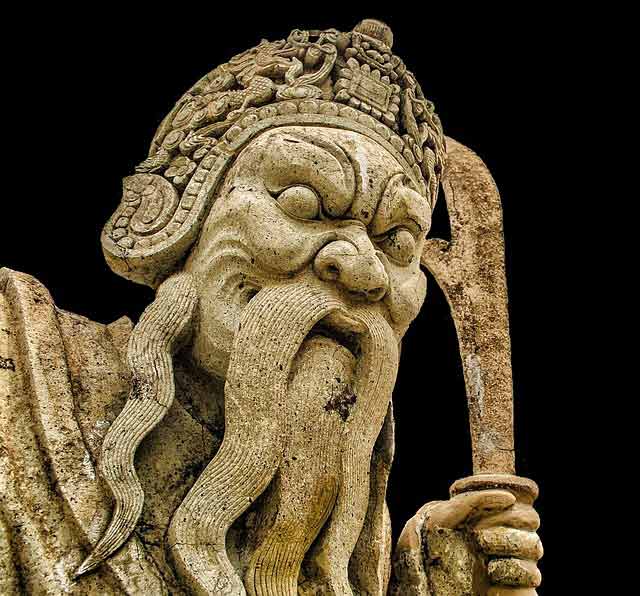
Abhimanyu was actually the soul of a Daitya (demon) named Kalyavana. Krishna after burning Kalyavana to death had captured his soul and taken him to Dwaraka only to stuff him into a cupboard.
According to Krishna, Abhimanyu was an incarnation of a very powerful demon named (Kalayvan) who was capable of killing him at a later point. Abhimanyu’s only weakness is his partial knowledge of Chakravyuha.
Hence the Chakravyuha was indeed launched to kill Abhimanyu as this was the only way by which Abhimanyu could attain Moksha. Therefore, Krishna never imparts the knowledge of “how to come out of Chakravyuha to him.
8. Bhishma Pitamah’s real name was Devavrata
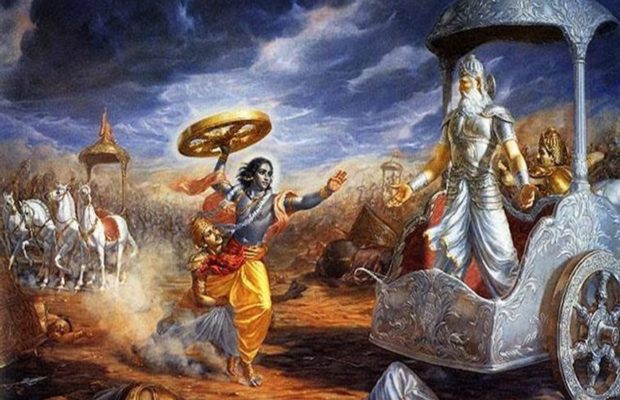
When Devavrata was a young man, his father Shantanu went on a hunt and fell in love with a local fisherwoman, Satyavati.
However, Satyavati’s father laid down a tough condition – he would only let him marry her if her sons became heirs to his throne. Shantanu returned to his kingdom heartbroken.
Devavrata, unable to see his father in this sad state went to persuade Satyavati to marry his father, offering to step aside as the heir.
Satyavati was not satisfied. Even if he steps down, she argued, his sons may claim the throne later. So, Devavrata took a vow never to marry or reproduce and came to be known as Bhishma (Terrible)
9. It was a Brahmana’s curse that killed Karna
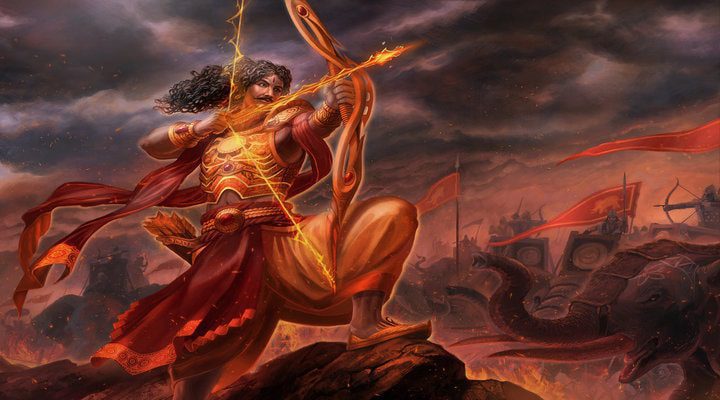
Karna, once when practicing the Shabdbhedi Arrow, mistook a Cow for a wild animal and shot it down. The Brahman to whom the cow belongs is distraught and curses Karna that he will be killed by his enemy when his attention is diverted when he is not in combat. This curse materializes when Karna is busy removing the chariot wheel from the mud and is shot by Arjuna.
When Karna went to Mahendra Parvat. He was practicing Archery with his Vijaya bow and then he inadvertently slew a Homa cow of a Brahmana who performed the Agnihotra Rite daily. Then Karna informed Brahmana about his inadvertent act and apologized for it.
Then Brahmana cursed Karna that Karna’s chariot wheel would be swallowed by the earth and he would be totally heedless and his head would be cut off by the warrior whom he always challenges, for whom he was striving so much.
10. Mahabharata was a world war
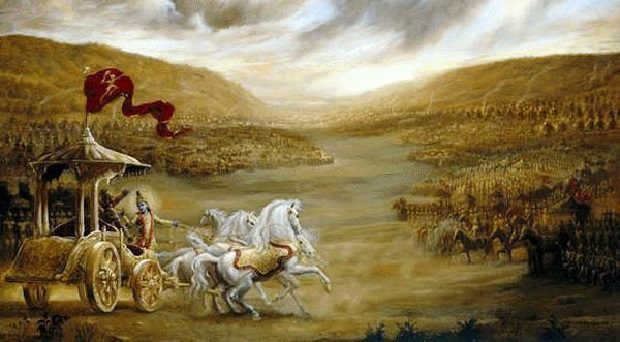
The real fight was not just between Pandavas and Kauravas, forces from Rome, and Greece were also a part of it.
The war caused widespread destruction, totally destroyed the social structure, and even raised a question mark on the survival of humanity. But that was 5000 years earlier.
11. Balram was the father-in-law of Abhimanyu
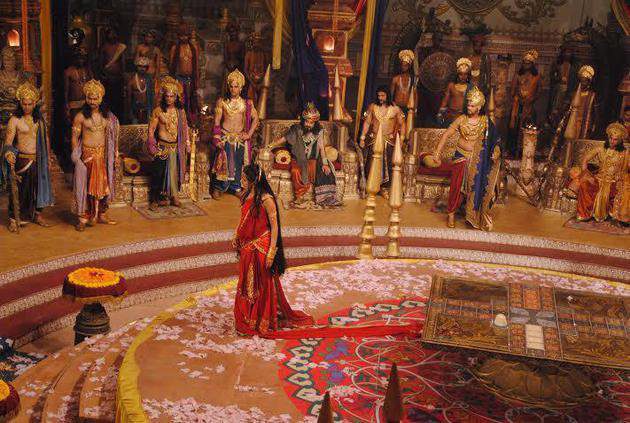
Abhimanyu was the son-in-law of Balarama. Abhimanyu’s wife Vatsala was the daughter of Balarama. He wanted that Vatsala should marry Laxman who was Duryodhana’s son.
Abhimanyu and Vatsala both loved each other and wanted to get married. Abhimanyu took the help of his brother Ghatotkacha. Ghatotkacha knew magic and he by his magic tricks went to Laxman’s marriage and terrified the groom.
He then took Vatsala with him and flew away and went to his brother Abhimanyu. Laxman was very upset from all this and he vowed that he will not marry throughout his life. Due to this Duryodhana was full of anger.
12. The five golden arrows that could have killed all Pandavas
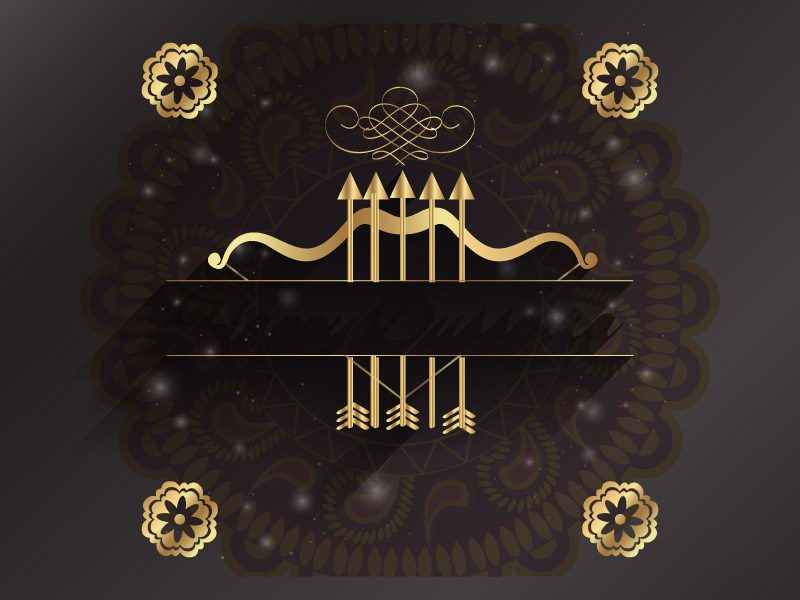
At the time of war — Bhishma who was on the side of Kaurava was accused by Duryodhana of intentionally, not doing any harm to Pandavas and even favoring them. On hearing this, Bhishma became very angry and in his anger, he took five gold arrows and filled them with mantras.
He vowed that the Pandavas would die before Sunset. On the other day Duryodhana suspected that Bhisma would never do anything wrong with them so, he took those arrows with him.
Lord Krishna reminded Arjun that Duryodhana had promised him of boon and he should ask him for five golden arrows. When Arjun asked him about the arrows Duryodhana was shocked and asked him how did he know about those arrows then Arjun replied “Lord Krishna”.
13. Bhim taunted Dhritrashtra and Gandhari after the war
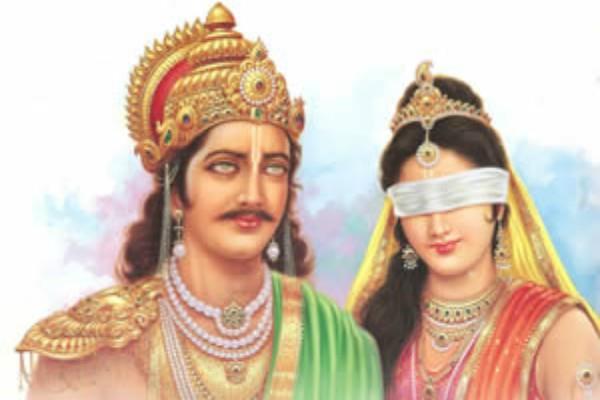
Dhritarashtra and Gandhari retired to the forest 15 years after Yudhisthir’s coronation. The main reason for this was Bhim’s taunts, which depressed them.
Bhima often used to remind them of the wicked deeds of their sons and how he killed them. These frequent mockings made them feel guilty and insecure as many also blamed the couple for not doing much to prevent the war.
14. Karna was the main culprit in Draupadi Haran (disrobing)
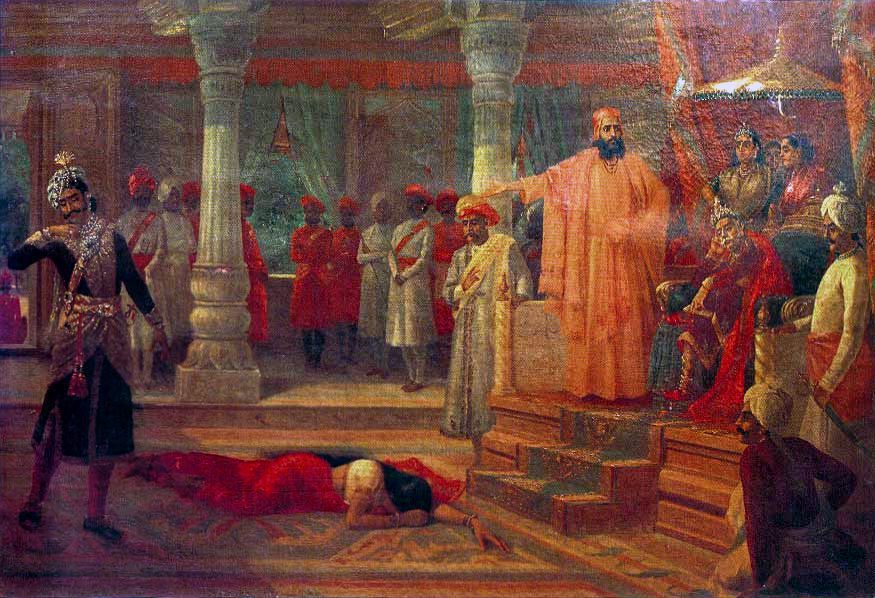
The disrobing of Draupadi was instigated by Karna, not Duryodhan. Duryodhan has been remarkably quiet during the entire episode except while asking Draupadi to come to court.
However, it’s Duryodhan and Dussasan who get most of the blame for the events that day.
15. Seven Maharathis of a Chakravhyu did not kill Abhimanyu
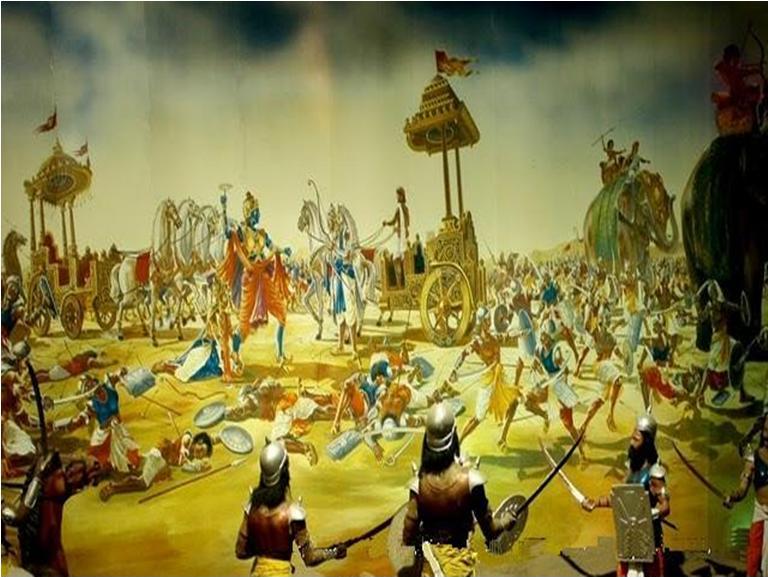
Although it is believed that the seven Maharathis of a Chakravhyu were the reason for Abhimanyu’s death, this is also not the complete truth as per the epic of Mahabhrata.
Abhimanyu had actually killed one of the seven Maharathis(warriors), who was Duryodhan’s son. Angry at this, Dharamsan, the son of Dushasan had killed Abhimanyu.
16. The first battle of Kurukshetra was not Mahabharata
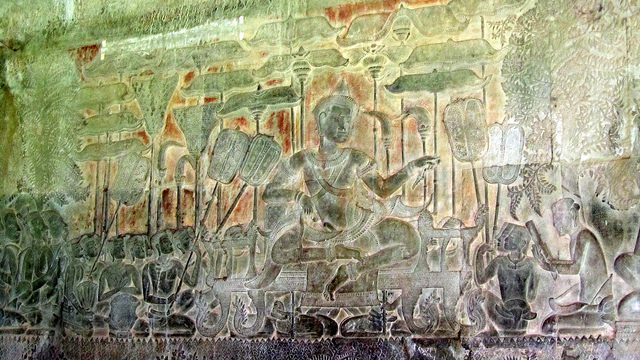
Indian Hindu sacred book Puranas mentions, Kurukshetra as a region named after King Kuru, the ancestor of Kauravas and Pandavas, as depicted in the epic Mahabharata.
The importance of the place is attributed to the fact that the Kurukshetra War of the Mahabharata was fought on this land.
The region currently lies very near to Indian capital New Delhi, in the state of Haryana.
However many people do not know that Mahabharata was not the first war that was fought in the region or on the battlefield. It was the battle between Bhisma Pitamah and Lord Parshuram who himself is considered to be a reincarnation of Load Vishnu, which was fought earlier.
As for the result, none of the great warriors could defeat the other. Such a great warrior that Bhisma Pitamah was!
17. Pandu’s Knowledge transfer and cannibalism
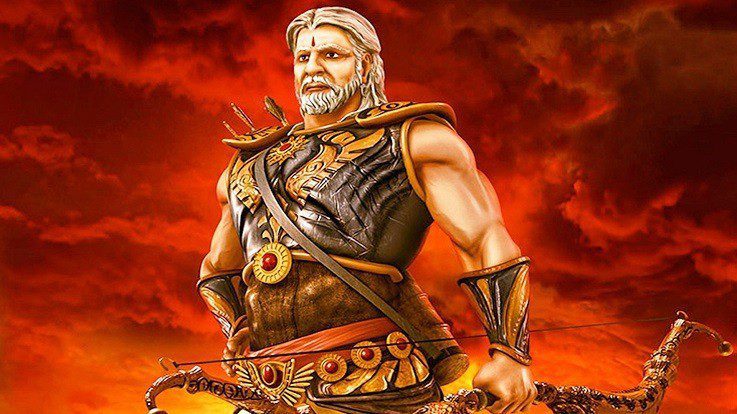
Pandu (Father of Pandavas) wished his sons must eat his flesh post-death so that all the knowledge may transfer to them which he had collected after so many years.
Only Sahadeva ate a piece — the moment he ate he was able to see the future but was stopped by God. He was a blessed astrologer and able to see the future
18. Arjuna had two more wives apart from Draupadi
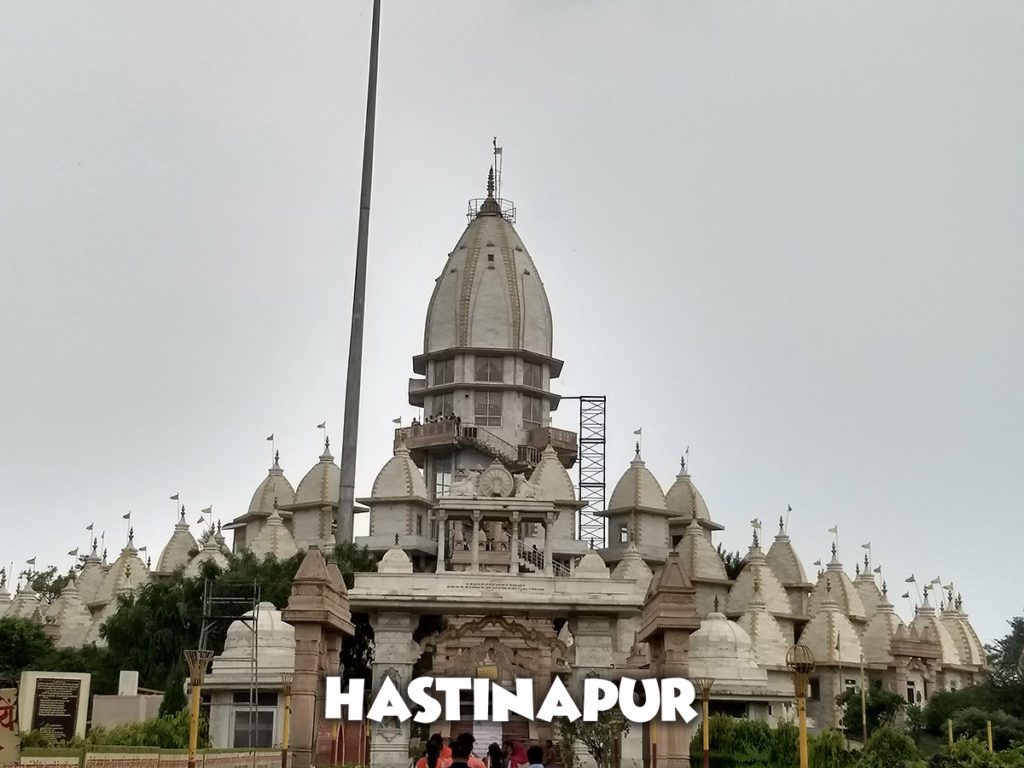
Arjun’s ‘pilgrimage’ for breaking his marital laws with Draupadi earned him three more wives. They were Chitrangada (Manipura), Ulupi (Naga) and Subhadra.
19. Arjuna could not even defeat thieves
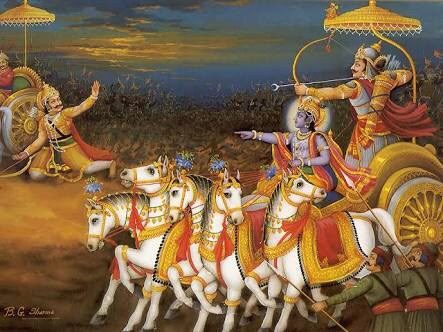
Arjuna stands tall as one of history’s greatest warriors. However, there’s a lesser-known episode from Krishna’s life that sheds light on his vulnerability.
In a surprising turn, many of Krishna’s wives were abducted by robbers out of sheer lust. This incident, largely unknown to many, unfolded in the Punjab region as described in the epic.
When Krishna departed for Vaikuntha, the spiritual realm, Arjuna found himself unable to protect Krishna’s wives. His bow felt heavy, and his mind blanked on the mantras he had mastered. Tragically, despite some resistance, eight of Krishna’s principal wives chose to end their lives. Others were seized by the marauders, leaving Arjuna powerless in the face of this calamity.
The stealing of Krishna’s wives and Arjuna not being able to stop it might be seen as things that happened because of what happened in the past (Kurukshetra War) or because they were meant to happen no matter what.
20. Bhima’s son was denied the throne like Dhritarashtra
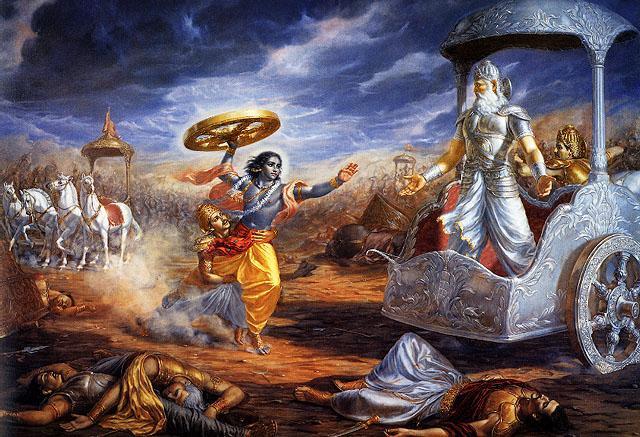
Bhima had one surviving son named Sarvaga by Balandhara, who was not given the throne despite being much elder than Parikshit. He became the ruler of Kashi (his mother’s land) instead.
Interestingly the same happened with Dhrirashtraya, his uncle, who was denied the throne due to his blindness and later became a pretext for the Kurukshetra war.
History seems to have repeated itself, without giving consequences though. It is easily one of the lesser-known facts from the Mahabharata.
21. Ekalavya was Krishna’s cousin
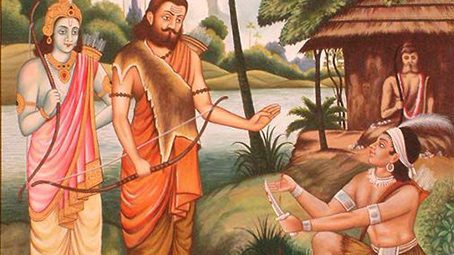
Ekalavya was the tribal prince of the Magadha and the leader of the tribe was the adoptive father of Ekalavya called Vyatraja Hiranyadhanus.
Not many people know that he was actually the biological son of Devashrava (brother of Vasudeva) who got lost in the forest and was found by a Nishada Hiranyadhanu. Ekalavya died protecting his father during Rukmini Swayamvar.
He was killed by Krishna. For his great sacrifice of Gurudakshina –Krishna blessed Ekalavya that he would soon be reincarnated and take revenge on Drona. This person was Dhristadyumna (who killed Drona).
22. Arjuna had once saved Duryodhana
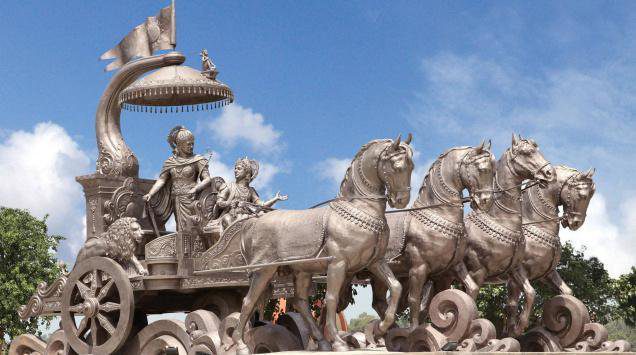
Duryodhana had gone to the Dwaita forest to humiliate the Pandavas with all the servants from Indraprastha. There the Gandharva Chitrasena and his apsaras were enjoying themselves in the pond.
Duryodhana asked Chitrasena to abandon the pool but as he refused, a heated argument broke out between them. Chitrasena attacked Duryodhana.
The Pandavas who were nearby asked Chitrasena to leave Duryodhana alone. Chitrasena who was a friend of Arjuna spared Duryodhana but not before tying him with vines and setting him on his horse.
Duryodhana though humiliated, thanked Arjuna and asked him what he wanted for the turn he had done to him. Arjuna said that he would ask Duryodhana some other time.
Remember the five arrows that could kill Pandavas. Arjuna could ask for them because of the promise made during this event.
23. The Powerful Chariot of Krishna
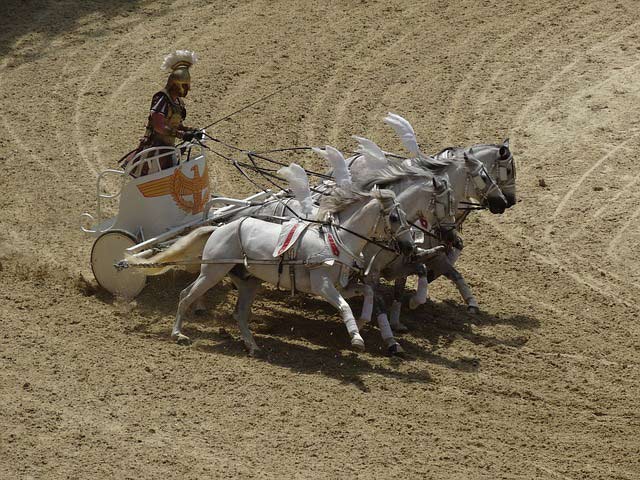
Krishna rode a chariot that was heavily potent and once when Arjun was done with the war, Krishna asked him to get off the chariot first, and then he got off.
As soon as he got off, the chariot exploded –Like a big explosion. That’s when he explained to Arjun why he asked him to get off the chariot first.
Saibya, Sugriva, Meghapuspa, and Balahaka were the names of horses that were ridden by Lord Krishna and linked to Arjun’s chariot. All the horses were owned by him.
24. Bhisma Pitamah was cursed by a woman
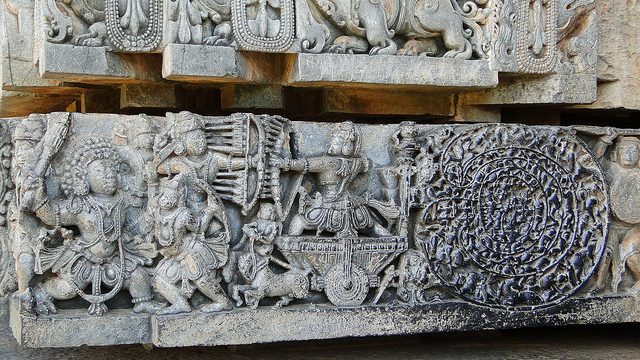
Bhishma Pitamah, also called the Ganga Putra, had been cursed by Shikandi while he was young. He had rejected her love and so she had taken an oath to kill Bhishma. Bhishma could not be killed unless he lowered his bow in the battle. He wouldn’t lower his bow against anyone but a woman.
Also, no woman was allowed to enter the battle. Shikhandi was born a woman and raised as a man. Bhishma refused to battle with Shikhandi.
Arjuna used the situation and shot a hundred arrows to the ground as there was no way the Pitamah could be killed. Pitamah had the gift of choosing his moment of death.
25. Chausar isn’t only a game of luck
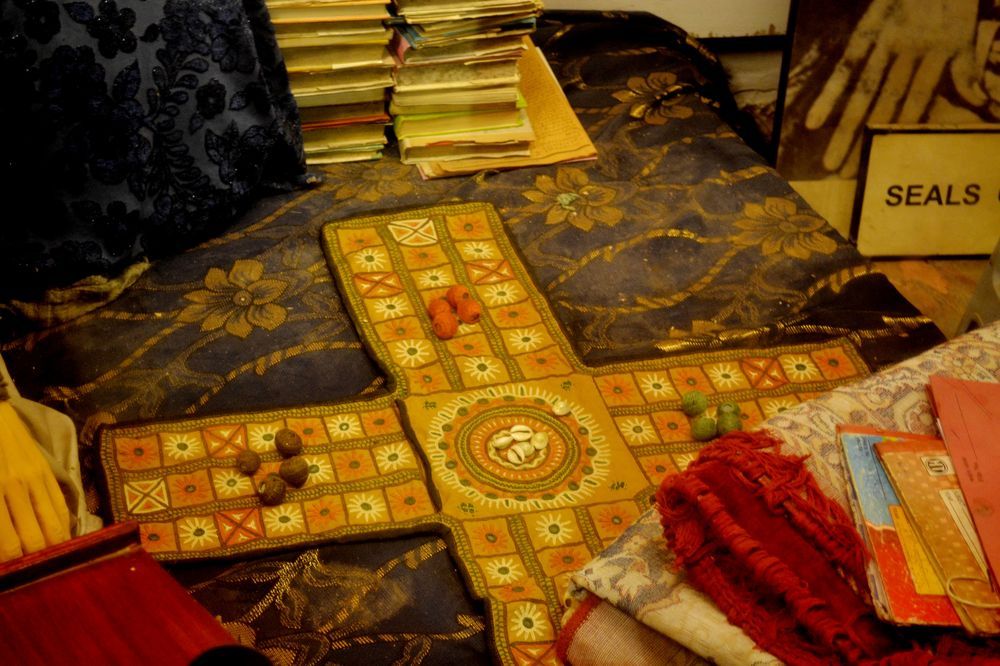
It is a common misunderstanding that the game of Chausar which has a critical role in Mahabharata is a game of rolling the dice where chance and luck play a critical role in the victory.
In fact, Chausar is a game of strategy and application. Shakuni does deserve some credit here.
He was the master of the game who no one else could defeat. This however also became one of the reasons for the Mahabharata war.
There are famous stories amongst kings passed on from generation to generation about kings who played this splendid game.
One particular tale tells of a King who had 2 trained mice called “Sundhree and Mundhreee”. This king would distract his opponent with details, stories, and tales.
He would then casually utter “Sundhree and Mundhree”; at this point, the mice would come and move the pieces around without the opponent noticing.
